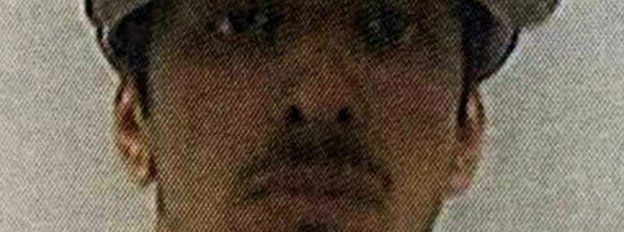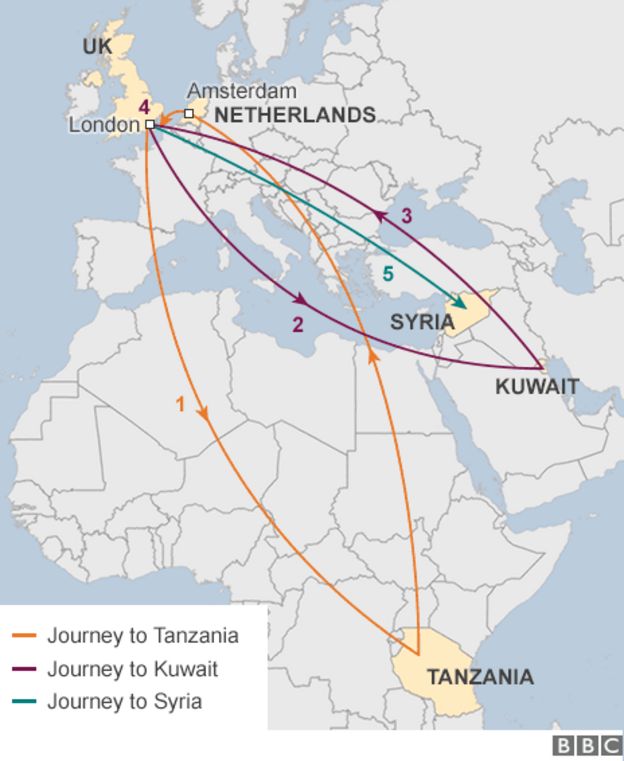'Jihadi John': US air strike
targets Islamic State militant
in Syria

US forces have carried out a drone strike in Syria against the Islamic State group militant "Jihadi John".
PM David Cameron said it was not yet certain whether the strike had been successful, but that targeting Mohammed Emwazi was "the right thing to do".
The Kuwaiti-born British militant appeared in videos of the beheadings of Western hostages.
It is believed there was one other person in the vehicle targeted in the attack near Raqqa.
Who is Mohammed Emwazi?
'Jihadi John' movement mapped
Emwazi 'claimed harassment'
Speaking outside Downing Street, Mr Cameron said any successful attack would have been "a strike at the heart of Isil [Islamic State]".
"It will demonstrate to those that would do Britain, our people and allies harm we have a long reach, we have unwavering determination and we never forget about our citizens," he said.
He described Emwazi as an "ongoing and serious threat" to civilians around the world, particularly in Syria and the UK.
"He was Isil's lead executioner and let us not forget he killed many, many Muslims too, and he was intent on murdering many more people.
"So this was an act of self-defence.
The prime minister added that his thoughts were with the families of those "who were so brutally murdered".
A senior US military source says the strike involved two MQ9 Reaper drones and took place at 20:50 GMT on Thursday.
Another US senior military source said there was a "high degree of certainty" Emwazi had been killed.
A formal statement from the Pentagon stopped short of asserting that Emwazi had definitely been killed, adding that it was assessing the operation.
Analysis
by Frank Gardner, BBC security correspondent
As the militant who sadistically murdered Western aid workers and journalists on camera, Mohammed Emwazi became a top target for US and British intelligence agencies, even though he is thought to have played no military role within Islamic State.
After his identity was revealed in February, Emwazi largely stayed out of sight, taking particular care not to leave a digital trail to his whereabouts.
But GCHQ, the UK government's communications headquarters, has expended enormous efforts to intercept and decipher any encrypted messages that might reveal his location or those of his associates.
Emwazi is believed to have travelled to Syria in 2013 and later joined IS militants.
He first appeared in a video in August last year, when footage was posted online showing the murder of US journalist James Foley.
He was later pictured in the videos of the beheadings of US journalist Steven Sotloff, British aid worker David Haines and UK taxi driver Alan Henning, as well as American aid worker Abdul-Rahman Kassig, also known as Peter, and Japanese journalist Kenji Goto.
He was also seen apparently killing a Syrian soldier during a mass beheading of Syrian troops.
In each of the videos, the militant appeared dressed in a black robe with a black balaclava covering his face.
Initially dubbed "Jihadi John" by the media, he was subsequently named as Emwazi, from west London, in February.
Mohammed Emwazi

- 1988: Born in Kuwait, moves to UK in 1994
- 2009: Completes computing degree at University of Westminster
- 2013: Tries to travel to Kuwait but is stopped. Disappears. Parents report him missing. Police tell family four months later he has entered Syria
Source: Cage, London-based campaign group
Earlier this year, details emerged about how Emwazi made a number of journeys abroad before he left for Syria in 2013.
They included a trip to Tanzania in August 2009, when he is believed to have first became known to security services in the UK.
His naming this year led to a row over the cause of his radicalisation, with British advocacy group Cage suggesting that contact with MI5 may have contributed to it.
However, Downing Street said that suggestion was "completely reprehensible", with Mr Cameron defending the UK's security services.
Civil war erupted in Syria four years ago, and now President Bashar al-Assad's government, IS, an array of Syrian rebels and Kurdish fighters all hold territory. Millions have been displaced and more than 250,000 people killed as a result of the fighting.
IS aims to establish a caliphate over the entire Muslim world, a state ruled by a single political and religious leader according to Islamic law, or Sharia. It already hold control of swathes of land in Syria and Iraq.
The militant group said it was behind twin suicide bombings in the Lebanese capital Beirut that killed at least 41 people on Thursday.
Kurdish forces have meanwhile entered the northern Iraqi town of Sinjarcaptured by IS last year, while the Iraqi army says it has begun an offensive to retake the key western city of Ramadi.
At least 700 people from the UK have travelled to support or fight for jihadist organisations in Syria and Iraq, British police say.
Security analyst Charlie Winter said that if Emwazi's death was confirmed, it could affect those wanting to join Islamic State "out of a sense of adventure".
He added: "They want to go and find a collective group where they can be part of something bigger. But they also don't want to die."
Mohammed Emwazi's movements before heading to Syria

- 1. Aug 2009, refused entry to Tanzania: travels to Tanzania with two friends, but is refused entry at Dar es Salaam. Tanzanian police have denied Emwazi's name is on their database of suspected foreign criminals detained and deported in 2009, as he had claimed. Emwazi and his friends are put on flight to Amsterdam, where they are questioned. They return to Dover and are questioned again.
- 2. Sept 2009, travels to Kuwait for work: leaves the UK for Kuwait for work.
- 3. May/June 2010, returns to UK for holiday: he returns to the UK for an eight-day visit.
- 4. July 2010, refused re-entry to Kuwait: Emwazi returns to the UK once more for a couple of days. He is stopped at Heathrow on his return to Kuwait and told he cannot travel as his visa has expired.
- 5. 2013, travels to Syria: Emwazi attempts to travel to Kuwait but is stopped and questioned. Three days later, he heads abroad. Police later inform his family he has travelled to Syria.

No comments:
Post a Comment